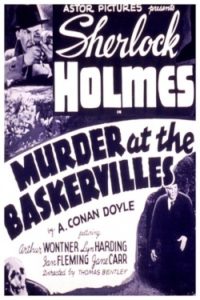“We’re old friends. I should hate to see you make such an ass of yourself as wrongfully to arrest the future son-in-law of Sir Henry Baskerville.” – Sherlock Holmes to Inspector Lestrade
Shockingly to some, there were highly regarded actors who portrayed Sherlock Holmes prior to Basil Rathbone’s ascendency into the role in the late 1930s. Though perhaps challenged later only by Jeremy Brett’s much more recent portrayals, many at the time of Rathbone’s initial role in The Hound of the Baskervilles preferred Arthur Wontner as the definitive Holmes.
With his popularity well on the wane today, perhaps many haven’t a clue who this Wontner character is. Arthur Wontner played Holmes five times on screen between 1931 and 1937, with Silver Blaze being the final entry in the series. Silver Blaze remained unreleased in the United States until 1941, when it was released as Murder at the Baskervilles in large part to capitalize on the already strong response to Rathbone’s own The Hound of the Baskervilles.
Many did (and do) consider Wontner to be closest to author Arthur Conan Doyle’s own perception and description of the now famous sleuth. While all of the physical accoutrements are there- the deerstalker cap, the pipe, the flat filled with curiosities and memorabilia, something is different. It’s Holmes himself.
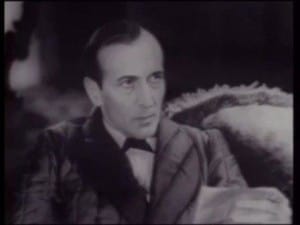 Wontner’s Holmes isn’t the somewhat snarky wit that we’ve come to expect from others- notably Rathbone himself. Rather, Wontner’s Holmes is a bit quieter, more reflective, less animated and seeming less engaged. While Rathbone’s Holmes is more likely to draw a pistol and swagger into the fray, Wontner’s is more likely to set a trap and patiently play checkers in his flat while it is sprung by others.
Wontner’s Holmes isn’t the somewhat snarky wit that we’ve come to expect from others- notably Rathbone himself. Rather, Wontner’s Holmes is a bit quieter, more reflective, less animated and seeming less engaged. While Rathbone’s Holmes is more likely to draw a pistol and swagger into the fray, Wontner’s is more likely to set a trap and patiently play checkers in his flat while it is sprung by others.
With one of his Holmes films lost (1932’s The Missing Rembrandt, based on “The Adventure of Charles Augustus Milverton”), the remaining films have several threads which connect them. Except for the last entry in the series, they are all rather faithful to their source material. Perhaps their most noticeable characteristic however, is the inherent lack of production values that the entire series has. Perhaps accounting somewhat for their lack of favor today, the series was clearly made with as little investment as possible. In comparison, Rathbone’s later Universal Holmes series- also not known for any financial extravagances- seems almost Oscar worthy.
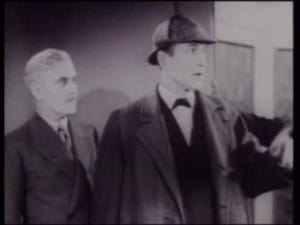 The only real asset the pictures have is Wontner himself as his supporting casts were weak and somewhat varied. In the span of five films we have two Dr. Watsons, three Inspector Lestrades, and two actors playing Doctor Moriarty.
The only real asset the pictures have is Wontner himself as his supporting casts were weak and somewhat varied. In the span of five films we have two Dr. Watsons, three Inspector Lestrades, and two actors playing Doctor Moriarty.
The last film in the series is perhaps the weakest, with the source material clearly not being strong enough to support a feature length film. Cast with Wontner is Ian Fleming as Watson, John Turnbull as Lestrade and Lyn Harding as Moriarty. Unlike most of the series and in a great departure from the immediately previous film in the series (1935’s exceedingly faithful The Triumph of Sherlock Holmes), screenwriters added and tweaked the source story “Silver Blaze” extensively.
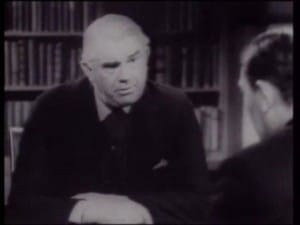 Among the tweaks were the addition of the Baskervilles and Moriarty to the story, neither of which are present in the original short story. This may account for Moriarty’s lack of any real master plan and delving into what is a relatively simple street crime.
Among the tweaks were the addition of the Baskervilles and Moriarty to the story, neither of which are present in the original short story. This may account for Moriarty’s lack of any real master plan and delving into what is a relatively simple street crime.
Set twenty years after The Hound of the Baskervilles, we see Holmes and Watson head back to the Baskerville estate on holiday, only to find themselves mired in a case involving a double murder and a missing race horse.
A powerful but close to bankrupt bookie has hired Moriarty to prevent Silver Blaze, an overwhelming favorite, from winning his next race. Acting much more like a street thug than the diabolical mastermind he is elsewhere, Moriarty accepts.
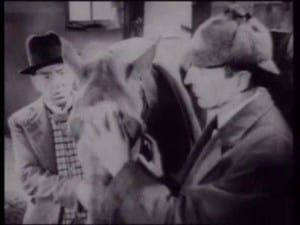 Days before the race, the horse and his trainer go missing and the stable boy charged with the horse’s care is found dead. Shortly after, Holmes finds the trainer dead on the moor with a broken neck, a medical scalpel at his side. Following tracks he also finds near the trainer’s body, Holmes finds the missing horse at a nearby estate, his namesake white patch of hair on his head cleverly covered with black paint.
Days before the race, the horse and his trainer go missing and the stable boy charged with the horse’s care is found dead. Shortly after, Holmes finds the trainer dead on the moor with a broken neck, a medical scalpel at his side. Following tracks he also finds near the trainer’s body, Holmes finds the missing horse at a nearby estate, his namesake white patch of hair on his head cleverly covered with black paint.
Holmes deduces that the trainer poisoned the stable boy and took the horse to the moor, planning to sever key tendons in its leg so it would lose the race. However, the horse kicked the trainer, killing him in the process.
Holmes gets the horse entered in the race, but Moriarty is one step ahead of him and has one of his henchmen shoot Silver Blaze’s jockey with a silent air gun deceptively hidden in a newsreel camera. The horse loses but Holmes has Watson trail Moriarty back to his lair.
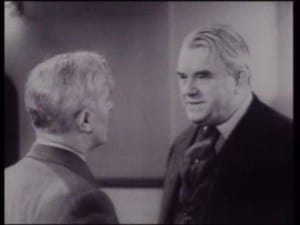 Knocked out and then interrogated by Moriarty, it is only when Watson is about to be thrown down an abandoned lift shaft does Holmes appear with Lestrade in tow to save the day. Ironically, Holmes has had the abandoned lift shaft repaired and appears behind the lift doors as Moriarty opens them as a precursor to tossing Watson down the shaft to his death. Just a thought, but if Moriarty has taken all these precautions to keep his lair secret, wouldn’t he hear if someone was repairing an elevator right outside his private office? Oh, well.
Knocked out and then interrogated by Moriarty, it is only when Watson is about to be thrown down an abandoned lift shaft does Holmes appear with Lestrade in tow to save the day. Ironically, Holmes has had the abandoned lift shaft repaired and appears behind the lift doors as Moriarty opens them as a precursor to tossing Watson down the shaft to his death. Just a thought, but if Moriarty has taken all these precautions to keep his lair secret, wouldn’t he hear if someone was repairing an elevator right outside his private office? Oh, well.
Besides Wontner the cast is rather average. Ian Fleming as Watson has little to do until the final reel except follow Holmes around, frequently being left behind. Watson here is needlessly dim, when even in his moment of truth in the final reel, when it is clear that Moriarty is going to kill him, he says, “You mean I am going to have trouble leaving here?” Great thinkers usually surround themselves with the same, and Watson doesn’t fit the mold.
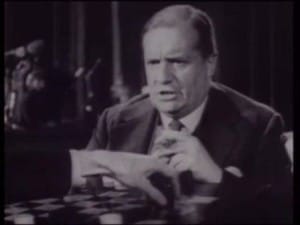 Lestrade fairs little better, though that is to some extent consistent throughout the ages as he has always played a significant second fiddle to Holmes. Only Lyn Harding has a spark of character, though sadly probably needs little more than a few street toughs to execute his plans.
Lestrade fairs little better, though that is to some extent consistent throughout the ages as he has always played a significant second fiddle to Holmes. Only Lyn Harding has a spark of character, though sadly probably needs little more than a few street toughs to execute his plans.
The greatest downfall of Murder at the Baskervilles is the story, which even with the additions doesn’t hold water for nearly long enough. One senses that Holmes could have had the entire ordeal wrapped up in twenty minutes or so. Coupled with the well below average sets Wontner himself is the reason to see this one.
